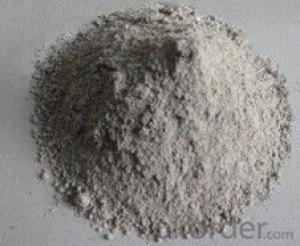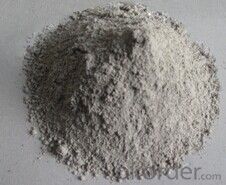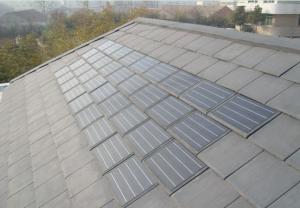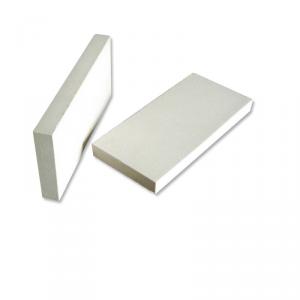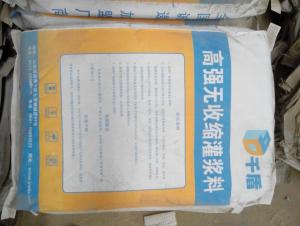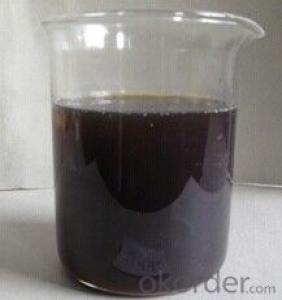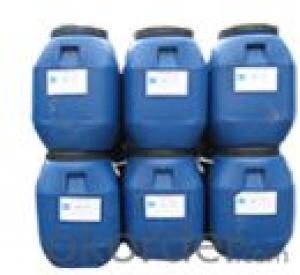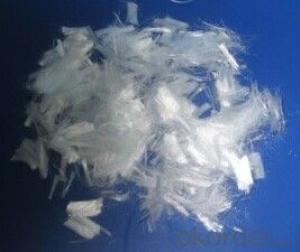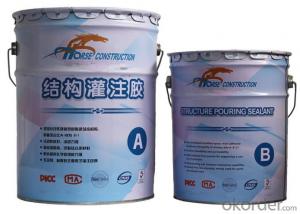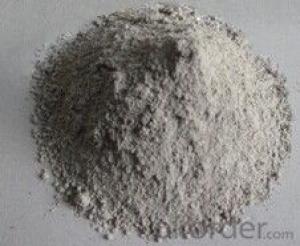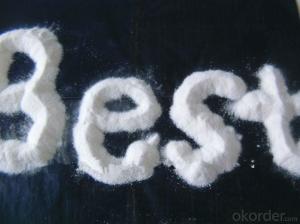High-strength Non-shrink Grout Materials for Steel Bar Anchoring
- Loading Port:
- China Main Port
- Payment Terms:
- TT OR LC
- Min Order Qty:
- -
- Supply Capability:
- -
OKorder Service Pledge
OKorder Financial Service
You Might Also Like
High-strength Non-shrink Grout Materials for Steel Bar Anchoring
Description
High-strength non-shrink grout materials for steel bar anchoring is a free flowing, non shrink high strength grout admixture.
● Early high strength: The strength after one day is up to 40MPa, the steel bars anchored under the normal temperature is permitted to draw after 24-hour.
● Vertical burying of steel bars: The grouts can be directly filled into all gaps of the steel bar burying holes after extended with water and mixed on site, without need for vibrating.
● Horizontal burying of steel bars: The GRM anchor material are extended with properly reduced water and mixed, and then stranded it into strips and inserted into the steel bar burying holes, into which, finally, the steel bars are buried.
● Micro expansion: It ensures no shrinkage and close contact between anchoring grouts and surfaces of the buried steel bars.
● Durability: No obvious change occurring in the strength after two million times of fatigue tests and fifty freezing-thawing cycle tests.
● Heat resistance: Welding is permitted on the steel bars which are anchored by such grouts. The heat resistance is up to 500℃ and no impact produced on anchoring strength.
Features
1. Early high strength: The strength after one day is up to 40MPa, the steel bars anchored under the normal temperature is permitted to draw after 24-hour.
2. Vertical burying of steel bars: The grouts can be directly filled into all gaps of the steel bar burying holes after extended with water and mixed on site, without need for vibrating.
3. Horizontal burying of steel bars: The GRM anchor material are extended with properly reduced water and mixed, and then stranded it into strips and inserted into the steel bar burying holes, into which, finally, the steel bars are buried.
4. Micro expansion: It ensures no shrinkage and close contact between anchoring grouts and surfaces of the buried steel bars.
5. Durability: No obvious change occurring in the strength after two million times of fatigue tests and fifty freezing-thawing cycle tests.
6. Heat resistance: Welding is permitted on the steel bars which are anchored by such grouts. The heat resistance is up to 500 and no impact produced on anchoring strength.
Applications
1. It can be used for construction of the steel bar anchoring on such bases as reinforced concrete, brick wall and rocks.
2. It mainly used for anchoring of the equipment foundation bolts, and anchoring and shot concreting project in the tunnel works, etc.
3. Construction is carried out with reference to relevant regulations in the Technical Specification for Construction of Concrete-based Grouting Material (YB/T9261-98).
4. Construction is carried out with reference to relevant regulations in the Specification for Construction and Acceptance of Concrete Structures (GB50204).
5. The anchoring grout is available after extended with water and mixed on site, with water consumption recommended in the Quality Certificate. The construction of horizontal anchoring can be implemented in the way of stranding the grouts into strips or by means of self-flowing.
Technical Specifications
Compressive Strength (MPa) | Vertical Expansion Rate | Fluidity | Reinforcement Adhesiveness | Water | Pouring Quantity | Critical Particle | ||
1 d | 3 d | 28 d | ||||||
30-50 | 40-60 | 70-80 | 1-3‰ | ≥240mm | 6MPa(round steel) | 10-14% | 2200kg/m3 | 3mm(Particle Adjustable) |
- Q: I just do the interior decoration of this line, see people painted toilet waterproof material Dan Dan Guan porcelain porphyry porch corpses Han Jian said is used for the back of the water, I do not understand the back surface specifically refers to what surface, I know that direct In the plaster wall coated with waterproof material, and then coated with a layer of cement mortar, and then paste the wall is it? But why is it said that this layer of waterproof material called back water? That is what the surface of the river ah? More
- May be your understanding of the error, the general waterproof, are in the water to do the water, whether it is the external walls, roof or bathroom are done from the water surface to do waterproof, waterproof from the back of the water, high cost, waterproof effect is not Stable, directly from the problem to solve not better?
- Q: What materials do the bathroom waterproof anti-leakage ah? Do not use cement directly?
- With cement is certainly not work, if the bathroom caissons and sidewalls need to use a different waterproof material, caisson is best to use polyurethane type, like CQ101 is the best use of caissons, but the side wall you can not use CQ. because the side wall with CQ. then you are sticky instability tiles, it can only use JS, that is, CQ. CQ101 and CQ105 is a brand of models, specifically what I do not say. Long-term soaked with the best polyurethane, such as the caisson belongs to this category; over the water on the best use of JS, the side wall is Dan often grass end of the whole factory households like this! Pure hand to play, hope to adopt.
- Q: Whether the mortar waterproofing agent needs to be sampled for inspection
- need According to the specification, the admixture of the approach must have the certificate and the product instruction manual, and then need qualified laboratories according to the proportion of the manual, the trial test, the performance is qualified before allowing the use of construction
- Q: Recently to do the concrete (texture) model, probably a flower pot size, to find the next material, only to find mortar, mortar, yellow sand and the like, cement, then it seems to sell a few bags of white water Danti orange Li Li mat Dead mud, or white portland cement. What I want to do is the kind of concrete that is gray. Do not know what materials I want to stir or mortar mixing directly to the abrasive on the like? If you want to use the mortar, then, is to buy rigid or flexible? More
- Gypsum, model paint, and then effect liquid. The The The
- Q: Is it possible to protect the waterproof layer of fine concrete? Is the mortar protective layer applied directly to the linoleum? Like the rough sand will Ge broken linoleum it? And mortar layer thickness strength is not large, can play a protective role? In fact, do not understand what the protective layer to protect, is the roof of the people, set the load crushed waterproof layer? Rigid waterproof layer I do not know what to protect. More
- There are two types of protective layers for flexible waterproofing: flexible protection and rigid protection. Flexible protection is a layer of cement on the coil. Rigidity protection is a layer of 2CM thick cement mortar. Rigid waterproof roofing: mainly mortar or concrete rigid materials. Flexible waterproof roof: the use of asphalt, high polymer, polymer membrane. Both waterproofing practices have their own advantages and disadvantages: Rigid waterproof roofing Advantages: long service life. Disadvantages: from the major, roof structure limited. Flexible waterproof roof Advantages: toughness, to adapt to a certain deformation and expansion, easy to crack. Diaoban bitter liver Feifei put ten ginger shortcomings: the use of a shorter life.
- Q: Commercial concrete and dry mortar need to provide the other side of the information to the construction side
- First of all to provide commercial concrete and mortar mix design alone, followed by each time you need to use mixed station to provide concrete factory certificate, the scene to do slump and the same conditions test block. In accordance with the requirements of the construction unit to provide 28-day-scale standard compressive strength of the standard report, the qualified is the completion of this batch of concrete concrete work.
- Q: Cement mortar label M. M7.. M. C. C25; cement grade C. C. C. C. etc., are used to which stage of the building, at the edge of the fool, Pile, beam and other general use of the number of cement, cement mortar are used where? More
- M is the red brick label, cement mortar is Mb
- Q: Basement wall wipe 20 thick PG waterproof mortar, what is "PG waterproof mortar"?
- Definition: the so-called refers to the cement mortar mixed with a variety of waterproofing agent prepared by a class of new waterproof building materials products; usually joined the waterproofing agent is a variety of inorganic or organic chemical raw materials consisting of admixtures, Can improve the mortar impermeable, so the name was born
- Q: What are the reasons for the cracking of the exterior wall insulation
- What are the causes of cracking caused by the insulation of the finishes?
- Q: [Single choice] the following materials, do not belong to the commonly used building mortar cementing material is (). [Two construction division "construction] A. Lime B. cement C. fly ash D. gypsum
- Answer: This is a building materials on the technical and performance of the title, the main assessment of commonly used building mortar using the knowledge of cementing materials
Send your message to us
High-strength Non-shrink Grout Materials for Steel Bar Anchoring
- Loading Port:
- China Main Port
- Payment Terms:
- TT OR LC
- Min Order Qty:
- -
- Supply Capability:
- -
OKorder Service Pledge
OKorder Financial Service
Similar products
Hot products
Hot Searches
Related keywords
